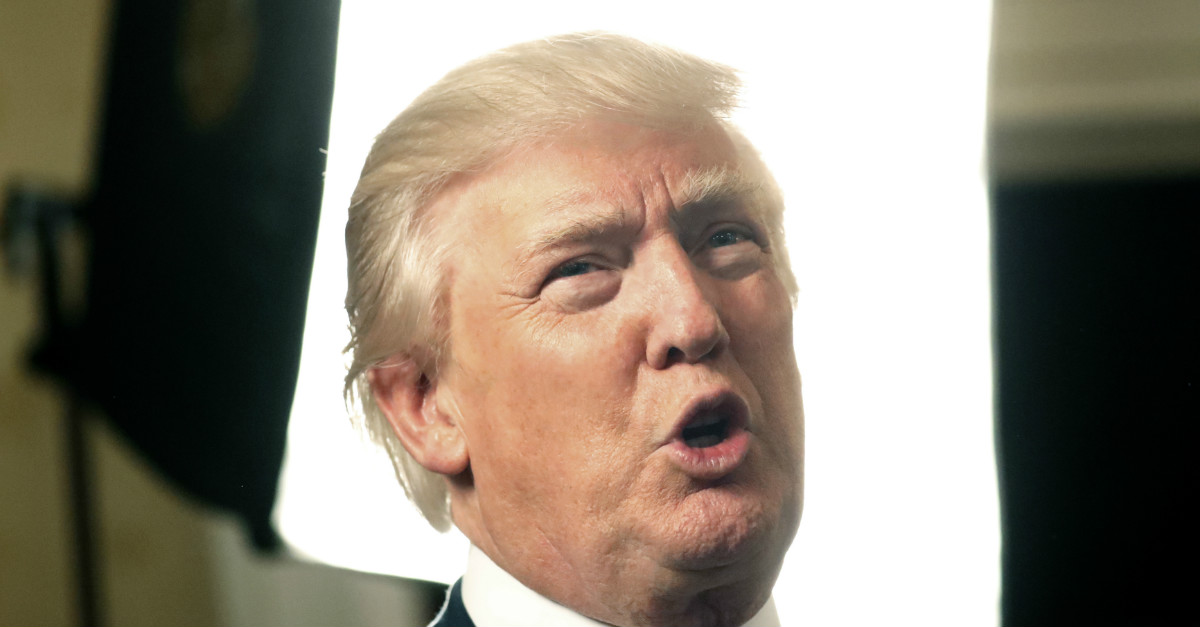President Trump likes to say he’s a “law and order” guy. He uses the phrase often, and he sold himself on the campaign trail as “the law and order candidate” who would “maintain law and order at the highest level.” Given Trump’s many comments on this theme, it’s worth examining how it has played out in practice on five major counts.
Videos by Rare
Rally violence
First up is Trump’s encouragement of violence against his political enemies. On multiple occasions, Trump advised his rally attendees to respond to protesters with force. He told his fans to “knock the crap out of them,” said he would pay their legal fees in the event of any litigation and expressed his own desire to “punch [a protester] in the face.” In fact, a federal judge has ruled it plausible that Trump “implicitly encouraged the use of violence or lawless action,” allowing a lawsuit making that allegation to move forward. Likewise, two of the Trump supporters accused of engaging in rally violence have stated in court filings they did so only at Trump’s encouragement.
RARE POV: Trump’s plan to escalate militarized policing will make police brutality worse
Jeff Sessions appointment
The second “law and order” incident worth noting is Trump’s appointment of Jeff Sessions to the role of attorney general, arguably the president’s single worst choice among his nominees for top government positions. Sessions is an unrepentant drug warrior with a chronically awful record on criminal justice issues more broadly. He is not above attempting to deceive Congress to advance his inhumane crusade against medical marijuana, and he is a staunch advocate of civil asset forfeiture, the appalling practice in which the government confiscates the money and property of people who have not been charged with any crime. Sessions has demonstrated a consistent disregard for individual liberty and constitutional rights, and he is a disgraceful pick for attorney general.
Police brutality speech
Third is the speech Trump gave to an audience of police officers in late July. “When you see these towns, and when you see these thugs being thrown into the back of a paddy wagon — you just see them thrown in, rough — I said, ‘Please don’t be too nice,’” he infamously remarked. “Like when you guys put somebody in the car, and you’re protecting their head, you know, the way you put their hand over? Like, don’t hit their head, and they’ve just killed somebody — don’t hit their head. I said, ‘You can take the hand away, okay?’” Trump’s comments were met with laughter and applause, and though many police departments later condemned the remarks, they typically failed to admit he was encouraging a problem that already exists.
RARE POV: A sadist, not a sheriff
Joe Arpaio pardon
Fourth, on Friday Trump issued his first presidential pardon, giving a “Get out of jail free” card to former Arizona sheriff Joe Arpaio, who was found guilty of criminal contempt of court for refusing to obey a court order prohibiting him from detaining people purely because he thought they might be illegal immigrants on the basis of their ethnicity. Trump praised Arpaio as a “patriot” and a “great law enforcement person,” which is an interesting way of describing a man best known for violating the Constitution. Arpaio has described his own jail as a “concentration camp,” arrested reporters over coverage he didn’t like and cost taxpayers enormous sums in lawsuits over his misconduct. His jailers chained a pregnant woman to her bed until she delivered her child stillborn, and one of his SWAT teams drove a dog trying to flee a burning building back inside to die.
Military gear
Fifth and finally, on Monday Trump announced his undoing of modest reforms President Obama made to a Pentagon program that distributes old military equipment to local police departments for use against civilians. This program allows weapons of war to be used in American streets — bayonets, grenades and track-propelled armored vehicles are among the items now allowed for distribution to police forces. While Obama’s reforms were mostly symbolic, Trump’s reversal — like the rally violence, the Sessions appointment, the police brutality speech and the Arpaio pardon — communicates a lot about what he means when he says “law and order.”
It communicates, as police misconduct expert Radley Balko wrote Monday, that “[u]nder this administration, there will be zero interest in discussion, oversight or prevention of police abuse,” and that as far as Trump is concerned, policing can’t be “too aggressive, too militaristic, too abusive [or] too biased.”
For Trump, “law” means government agents like Arpaio, and police officers more generally, are above the law, while the general public is subject to the sort of encroachments on personal liberty Sessions supports. And “order” means these onerous laws will be enforced violently, with tools of war and consequence-free targeting of people Trump dislikes.
For Trump, “law and order” is overcriminalization and abuse.



